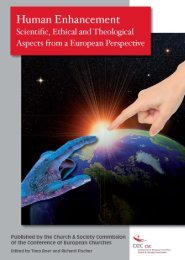Christians and Muslims: Praying together - Churches in Dialogue ...
Christians and Muslims: Praying together - Churches in Dialogue ...
Christians and Muslims: Praying together - Churches in Dialogue ...
Create successful ePaper yourself
Turn your PDF publications into a flip-book with our unique Google optimized e-Paper software.
eflect<strong>in</strong>g the universal phenomenon of prayer it was stated (us<strong>in</strong>g the expression<br />
<strong>in</strong>terreligious <strong>in</strong> a different way): „We see <strong>in</strong>terreligious prayer as a shar<strong>in</strong>g <strong>in</strong> the »groan<strong>in</strong>g<br />
of the whole creation«, long<strong>in</strong>g for the fullness of salvation <strong>and</strong> liberation, partak<strong>in</strong>g <strong>in</strong> the<br />
groan<strong>in</strong>g of the Spirit«, the Spirit who susta<strong>in</strong>s us <strong>in</strong> our weakness s<strong>in</strong>ce we do not know how<br />
to pray.<br />
Interreligious prayer is an expression of the com<strong>in</strong>g <strong>together</strong> of all the »scattered children of<br />
God«. It is a shar<strong>in</strong>g <strong>in</strong> the common journey towards the fulfilment of the K<strong>in</strong>gdom of God. ...<br />
Prayer <strong>together</strong> is an <strong>in</strong>vitation to friendship, to share the reality of a lov<strong>in</strong>g God who is our<br />
Creator, Redeemer <strong>and</strong> Susta<strong>in</strong>er. It is an <strong>in</strong>vitation to enter <strong>in</strong>to the mystery of God which is<br />
beyond human <strong>in</strong>tellectual grasp <strong>and</strong> underst<strong>and</strong><strong>in</strong>g.“ 6<br />
Such experimentation with <strong>and</strong> development of common rituals has been a response to our<br />
shared life rather than any artificial religious exercise. One has to bear <strong>in</strong> m<strong>in</strong>d that rituals<br />
carry a range of mean<strong>in</strong>g, vary<strong>in</strong>g <strong>in</strong> significance from traditional ceremony to sacrament.<br />
Clearly, sacraments cannot be shared with <strong>Muslims</strong>.<br />
From an external perspective, especially <strong>in</strong> a secularised society, religion <strong>and</strong> its practices are<br />
given a m<strong>in</strong>or role, whereas with<strong>in</strong> the context of religious conviction rituals cannot be<br />
neglected. In most western European countries religion no longer has a rul<strong>in</strong>g function but a<br />
serv<strong>in</strong>g one. Jesus as a servant is the example how to behave <strong>in</strong> such circumstances. He<br />
encountered several non-Jewish people <strong>and</strong>, far from reject<strong>in</strong>g them, helped them. This must<br />
be our model for how to behave today.<br />
An Orthodox View<br />
The Orthodox Church’s theology is permeated with the conviction that the Holy Spirit works<br />
<strong>in</strong> ways transcend<strong>in</strong>g human thought <strong>and</strong> imag<strong>in</strong>ation <strong>and</strong>, therefore, cannot be conf<strong>in</strong>ed<br />
with<strong>in</strong> any theological system, nor described with any f<strong>in</strong>ality nor anticipated <strong>in</strong> predictable<br />
ways. Everyth<strong>in</strong>g ennobl<strong>in</strong>g <strong>and</strong> essentially good is the effect of the action of the Holy Spirit,<br />
whose fruit – “love, joy, peace, patience, k<strong>in</strong>dness, goodness, faithfulness, gentleness <strong>and</strong><br />
self-control” (Galatians 5,22) - is essential to any harmonious existence. From this assurance<br />
of St Paul we may conclude that wherever this fruit is found there we may discern the action<br />
of the Holy Spirit. And, at first glance, such fruit can be found <strong>in</strong> the life of many <strong>Muslims</strong>.<br />
However, even today, Christian <strong>and</strong> Muslim <strong>in</strong>habitants of the traditionally Orthodox regions<br />
of Europe do not have the opportunity of common prayer. This is due to three factors:<br />
1. Historical context: Orthodox nations <strong>and</strong> <strong>Muslims</strong> had for centuries the misfortune<br />
to coexist as conqueror <strong>and</strong> conquered. In Southeastern Europe the faithful of both<br />
religions lived <strong>together</strong>, know<strong>in</strong>g the limits of their possible <strong>in</strong>teraction. This historic<br />
memory cont<strong>in</strong>ues to shape relations today. There is, of course, mutual respect, but<br />
there is also a def<strong>in</strong>ite distance to enable religious obligations to be carried out <strong>and</strong><br />
this distance is preserved <strong>in</strong> <strong>in</strong>terpersonal contacts. For example, mixed marriages are<br />
extremely rare <strong>and</strong> if they ever occur, the wedd<strong>in</strong>g ceremony is a civil one, while<br />
spouses decide about the upbr<strong>in</strong>g<strong>in</strong>g of the children. Religious leaders have excellent<br />
communication between themselves as do the laity. In religious feasts gifts between<br />
6 Pontificium Consilium pro Dialogo <strong>in</strong>ter Religiones, Interreligious Prayer, Pro Dialogo & Current <strong>Dialogue</strong>,<br />
Bullet<strong>in</strong> 98, 1998/2, p. 237-243; here: p. 240.<br />
8















